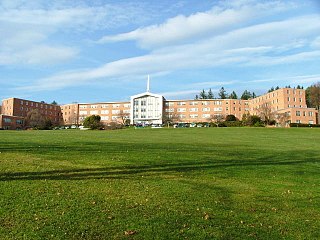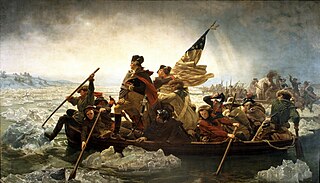Related Research Articles
The Seneca are a group of Indigenous Iroquoian-speaking people who historically lived south of Lake Ontario, one of the five Great Lakes in North America. Their nation was the farthest to the west within the Six Nations or Iroquois League (Haudenosaunee) in New York before the American Revolution. For this reason, they are called “The Keepers of the Western Door.”
Universal manhood suffrage is a form of voting rights in which all adult male citizens within a political system are allowed to vote, regardless of income, property, religion, race, or any other qualification. It is sometimes summarized by the slogan, "one man, one vote".
Clarence Crane Brinton was an American historian of France, as well as a historian of ideas. His most famous work, The Anatomy of Revolution (1938) likened the dynamics of revolutionary movements to the progress of fever.

The Kripalu Center for Yoga & Health is a nonprofit organization that operates a health and yoga retreat in Stockbridge, Massachusetts. Its 160,000-square-foot (15,000 m2) facility is a former Jesuit novitiate and juniorate seminary built in 1957.

Pennsylvania was the site of many key events associated with the American Revolution and American Revolutionary War. The city of Philadelphia, then capital of the Thirteen Colonies and the largest city in the colonies, was a gathering place for the Founding Fathers who discussed, debated, developed, and ultimately implemented many of the acts, including signing the Declaration of Independence, that inspired and launched the revolution and the quest for independence from the British Empire.

Thomas Gawthrop "Doggie" Trenchard was an All-American football player at Princeton University in 1893 and a college football head coach at the University of North Carolina at Chapel Hill, the University of Pittsburgh, and West Virginia University.

The Marcellus Formation or the Marcellus Shale is a Middle Devonian age unit of sedimentary rock found in eastern North America. Named for a distinctive outcrop near the village of Marcellus, New York, in the United States, it extends throughout much of the Appalachian Basin.

The current Franklin County Courthouse in Chambersburg, Pennsylvania, built in 1865, is the third courthouse building on the site. The site was originally purchased from Colonel Benjamin Chambers in 1785.
Daniel P. Moul is an American politician and businessman currently serving as a Republican member of the Pennsylvania House of Representatives from the 91st District since 2007.
James A. Cox, Jr. is an American politician. He was a Republican member of the Pennsylvania House of Representatives from the 129th District from 2007 until 2022.
Nicholas "Nick" Miccarelli III was an American politician from Pennsylvania who served as a Republican member of the Pennsylvania House of Representatives for the 162nd legislative district until January 2019.
Land value taxation has a long history in the United States dating back from Physiocrat influence on Thomas Jefferson and Benjamin Franklin. It is most famously associated with Henry George and his book Progress and Poverty (1879), which argued that because the supply of land is fixed and its location value is created by communities and public works, the economic rent of land is the most logical source of public revenue. and which had considerable impact on turn-of-the-century reform movements in America and elsewhere.

Frank Burns is a Democratic member of the Pennsylvania House of Representatives. He represents the 72nd District, located in southwestern Cambria county. Despite Cambria County moving heavily towards Republicans, Burns has been able to fend off several challengers. Most recently, he defeated Renae Billow by a 10% margin which helped give the Democrats a majority in the chamber for the first time in over a decade.
Margaretta M. Lovell is an American art historian who serves as the Jay D. McEvoy, Jr. Professor of the History of Art at the University of California, Berkeley. Her research and teaching center on the art and history of the United States, including eighteenth- and nineteenth-century landscape painting, portraiture, decorative arts, furniture, architecture, food, and forests.

The Pennsylvania Chronicle and Universal Advertiser was an American colonial newspaper founded in 1767 that was published in Philadelphia, Pennsylvania, prior to the American Revolution and was founded by William Goddard and his silent business partners Joseph Galloway and Thomas Wharton. Benjamin Franklin, an associate of Galloway, was also a partner with the Chronicle.
Richard Roy Beeman was an American historian and biographer specializing in the American Revolution.

The outdoor statue of Benjamin Franklin in Washington, D.C., is located near the intersection of 12th Street and Pennsylvania Avenue, in front of the Old Post Office. The statue was a gift from Stilson Hutchins, founder of The Washington Post, who wanted to display his and the newspaper's stature in the city. The designer, Ernst Plassmann, and sculptor, Jacques Jouvenal, were both German-American artists. The architect of the memorial was J. F. Manning.

Fay Ajzenberg-Selove was an American nuclear physicist. She was known for her experimental work in nuclear spectroscopy of light elements, and for her annual reviews of the energy levels of light atomic nuclei. She was a recipient of the 2007 National Medal of Science.
David M. Maloney Sr. is an American politician from the Commonwealth of Pennsylvania. A member of the Republican Party, he is a member of the Pennsylvania House of Representatives from the 130th District.
John Allan Nagy, was a nonfiction writer on the American Revolution with an expertise in the field of espionage and mutinies.
References
- ↑ "The South Park Historian" (PDF). 6 (3). 1 July 2002. Archived from the original (PDF) on 2 December 2010. Retrieved 2009-02-02.
{{cite journal}}: Cite journal requires|journal=(help) - ↑ Fleming, George T (1922). History of Pittsburgh and environs, from prehistoric days to the beginning of the American Revolution. New York, Chicago: American Historical Society. pp. 30–32. OCLC 19808084 . Retrieved 2009-03-02.